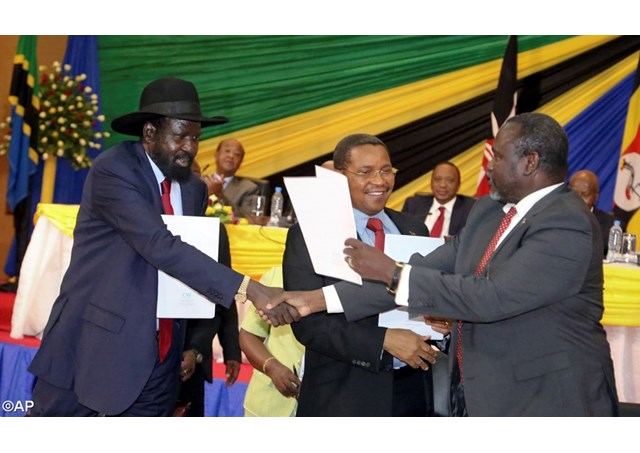
South Sudan Council of Churches calls for compromise

Leaders of the South Sudan Council of Churches (SSCC) representing various Protestant and Evangelical Pentecostal Churches have concluded a meeting Thursday where they met to reflect on “the tragic situation of conflict in our nation and the recent collapse of the IGAD peace talks.” In a statement released after the meeting, the leaders (most of them Bishops) called on the people of South Sudan not to lose hope even when their warring political leaders failed to deliver peace recently.
“As Christians, we always have hope. When times are dark we remember that Christ suffered and died but then rose from the dead. Christ remains with us, and the Holy Spirit gives us strength and endurance. The people of South Sudan have experienced many decades of conflict, but we are confident that, with God's help, we will overcome the evil in our midst and will move forward in peace and justice,” the leaders said.
The South Sudan Council of Churches (SSCC has however insisted that both warring leaders President Salva Kiir and Riek Machar should honour the agreement on the re-unification of SPLM which they signed in Arusha recently. “We believe the Arusha process has the potential to complement the IGAD peace process,” reads the statement.
The Council of Churches says they intend to make it clear to all concerned (South Sudan’s politicians) that “the current attitude of the negotiating parties is unacceptable.” The warring parties should be more compromising for the sake of peace and country.
The Council of Churches has called upon South Sudanese to lay down arms. “We call upon all South Sudanese, but particularly the political and military leaders and those carrying arms, not to pursue selfish interests but those of others (cf Philippians 2:4). Put the interests of the nation above your own,” said a statement signed by eight of South Sudanese Protestant and Evangelical representatives.
The main objective of the Arusha agreement is to re-unite the splintered SPLM. The Arusha agreement is premised on the fact that South Sudan’s politicians have failed the people of South Sudan and the political rivals need to once more come together as one. The Arusha agreement outlines a road map to help move the IGAD peace process.
On the other hand the IGAD process consists of the East African regional bloc which stands for the Intergovernmental Authority on Development (IGAD). It is this bloc of countries that has been mediating a power sharing deal between the two South Sudan rivals. The IGAD peace process collapsed recently in Ethiopia when South Sudan’s President Salva Kiir and Riek Machar failed to reach a peace deal.
Ethiopian Prime Minister Hailemariam Desalegn who chaired the IGAD talks criticised South Sudan’s leaders for inaction and prolonging the suffering of their citizens in what he termed a “senseless war.”
Fighting in South Sudan erupted in December 2013 after President Salva Kiir dismissed his deputy, Riek Machar accusing him of plotting a coup. The war quickly took on ethnic tones. Since then, more than 10,000 people have been killed while more than 1.5 million are now displaced from their homes.
(e-mail: engafrica@vatiradio.va)
| All the contents on this site are copyrighted ©. |


